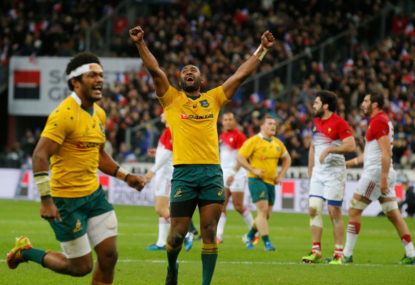What a thrilling, breathtaking night of Test rugby we were subjected to this weekend. Hemisphere bragging rights weighted slightly to the north after rugby’s finest went hammer and tongs at each other across the UK and Europe.
The heavyweight contest was in Dublin. New Zealand saw off a determined Ireland, who threw every shot in their locker – and then some more – which was enough for them to again dominate possession and field position but, this time, not the scoreboard.
The Irish will today be scratching their heads wondering how they failed to score a try, particularly in light of a one man advantage for a quarter of the match. Their analysis will show that their attack didn’t match the precision of Chicago, and that the All Black’s steelier defence didn’t allow them the same latitude.
It is said that defence is more attitude than technique, and on that count New Zealand’s intent to hit with heavy shoulders, and desire to scramble like madmen, was wholly impressive.
Less successful was some of their technique. The All Blacks appeared to target the ball carrier higher than last time, but the benefit of negating the Irish offload and recycle speed, carried a risk of illegal high contact.
In the end, the home crowd and media made more of it than what the facts justified. Nevertheless, Steve Hansen plainly has no wish to move forward with any stain on his team’s reputation for fair play, and it will be a surprise if the strike zone is not lowered next week. Not to mention addressing general discipline.
Ireland’s defence was no less intense – this truly was a brutal match – but crucially, the difference lay in three swift strikes, the All Blacks with that extra touch of class to create and finish, where Ireland couldn’t.
Hansen’s primary request this week was for his side to start well, to take pressure off his own side and to force Ireland into catch-up. And what a start it was, three minutes and 26 seconds of pulsating unbroken play from the kick-off, culminating in Malakai Fekitoa planting the ball, off a spearing Beauden Barrett kick-pass.
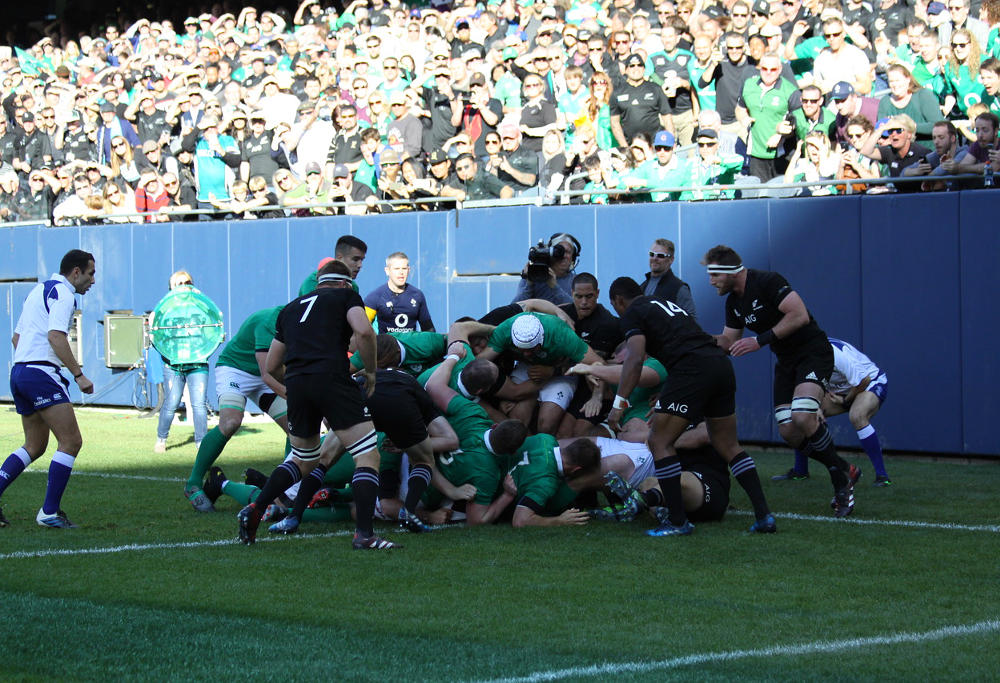
Ah, Beauden Barrett. The young man with an uncanny sense of timing, stepped up a week after being named IRB Player of the Year, and emphatically rubber stamped the decision; red hot in attack (key in all three tries), and a saviour on defence.
Post-match he was red-faced; from the heat of the contest, but also from his “almost embarrassing” miscalculation on his first half try put-down. His apology to fans and pledge to “never do it again”, totally believable.
Only a smidge behind him in man of the match stakes was Irish flanker Sean O’Brien. If he was apparently short of a run, nobody told him that, being all over the ball for the whole match.
He can’t have been helped losing his running mate CJ Stander early, although replacement Josh van der Flier had a massive impact, putting in a great shift.
At match end, beIN comments man Donal Lenihan lamented that the 21-9 scoreline didn’t reflect the Irish effort. True enough, but it did accurately reflect that while the gap between the All Blacks and themselves has narrowed, there is still a gap nevertheless.
Optimistic pre-match talk of a ‘reshaping of the world order’ can thus be put to bed for now, although the next encounter between these two sides can’t come quickly enough.
While the on-field intensity was down a notch in Florence, post-match celebrations will have been raucous with Italy securing their first ever win against the Springboks, 20-18.
SARU President Mark Alexander was quickly onto the front foot, emulating Private Jones from Dad’s Army with a “don’t panic, DON’T PANIC!” statement.
Others less kind might suggest that his coach, Allister Coetzee, is instead emulating Sergeant Schulz from Hogan’s Heroes, “I know NOTHING!”
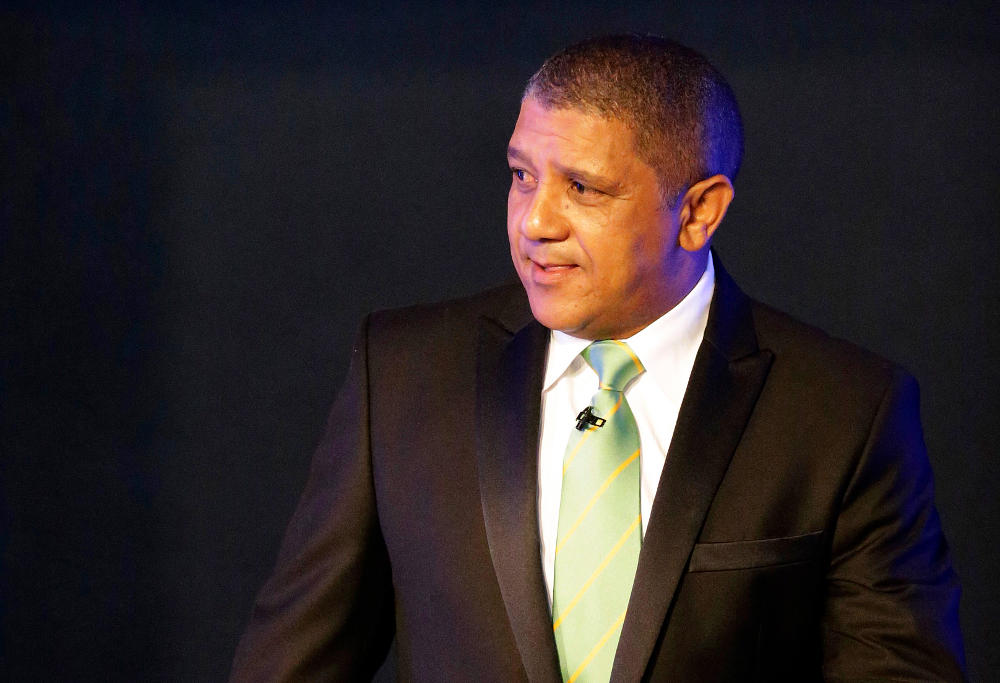
The task for Italy coach Conor O’Shea from here is to ensure that this result is a springboard to wins in the Six Nations, and not just a tainted kill against a down and dispirited South Africa.
There is no need to twist the knife any further into this Springbok carcass; the big picture problems are huge and wide ranging, but everybody, including Coetzee, really knows what needs to happen in the short term.
In other matches, Japan almost pulled off a shock against Wales, replacement Sam Davies sneaking over a last gasp drop goal for a 33-30 win.
It was a similar story at Murrayfield, Greig Laidlaw winning the match for Scotland 19-16 over Argentina, with the final kick of the match. The ramifications of this loss for Argentina, and indeed all of the top eight nations, are intriguing, with these two sides locked in a battle for eighth and ninth position ahead of 2019 World Cup seedings being finalised in May.
If Argentina finish ninth, there’s your instant ‘pool of death’ right there, that two unlucky seeded sides above them will have been desperate to avoid.
Elsewhere, Tonga edged out the USA in Spain, 20-17, and England kept the wheels turning, too strong for Fiji, 58-15, 9 tries to 3. More on the Fiji situation later.
In Paris, the highlights came thick and fast. A relieved Wallabies watching a final minute drop goal attempt by the ‘Mexican sharpshooter’ Camille Lopez, drift left, enabling them to hang on for a thrilling 25-23 win.
This was a match punctuated by a very high number of breakdown turnovers, David Pocock the king beast, relishing the No. 7 on his back once again.
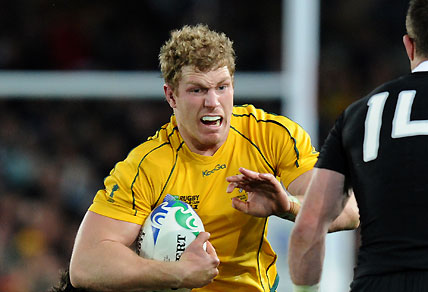
While it was scrappy at times, both sides showed great intent and the crowd was treated to a lively contest, always in the balance. France finished the stronger, and will feel aggrieved that they weren’t rewarded with a penalty at the final scrum.
One understands referee Glen Jackson’s reluctance to determine the result. France might also look in the mirror and conclude that they didn’t do enough with their final opportunity, and determine also that Jackson was very lenient in allowing their front row to veer inwards at the engage.
The difference between the sides in the end was one moment of magic from Tevita Kuridrani, somehow planting the ball in at the corner despite his feet being almost in the front row of the stands, Eric Cantona-style.
So-called Wallabies fans who, after the match, were quick to carp about hesitant defensive structures and a wobbly front row, totally miss the point. Michael Cheika will be delighted that an opportunity for a number of players to prove themselves at Test level was taken.
An emphatic response too to the nonsense spouted about his selection being some kind of insult to France. This was patently never the case. Cheika is entitled to pick whatever side he thinks serves Australia’s best interests.
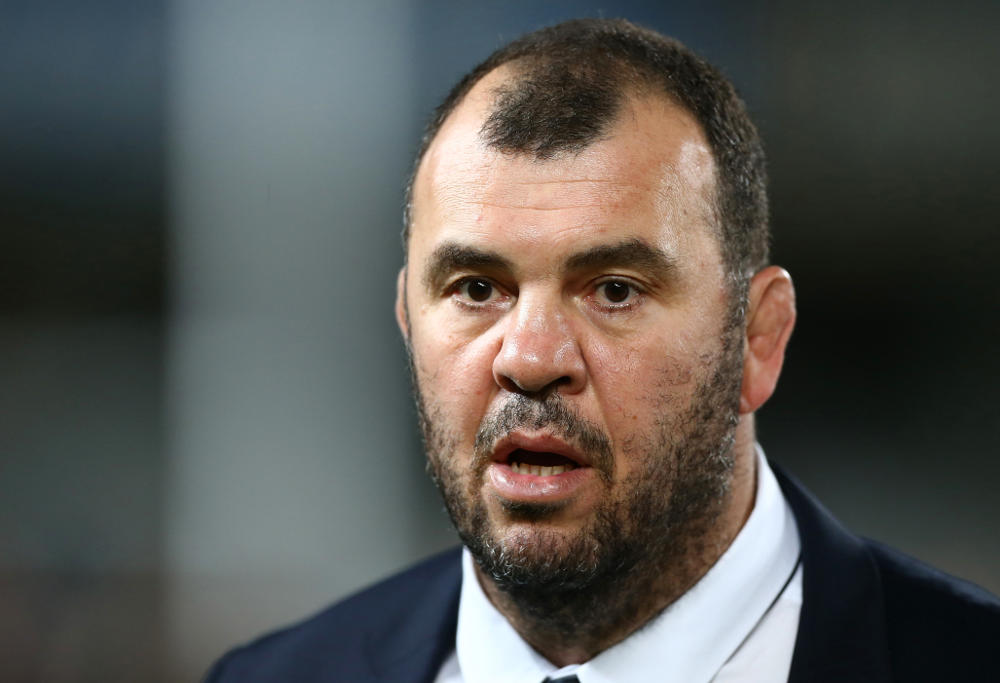
While Luke Morahan was the best of the newcomers, he had plenty of friends. Make no mistake, this is a win that is not only a huge confidence booster, but has far reaching implications for Australian rugby into the future.
This was by no means a poor French side; some of the passing and interplay recalled the vaunted ‘French flair’ that has been absent for too long. Wesley Fofana once again showed he is a gifted footballer, and Scott Spedding ran with great purpose.
Spedding however will rue not eyeing Noa Nakataci, in a thrilling French breakout from near their own line, and stabbing a kick in his direction, before Pocock nailed him and snuffed out the scoring opportunity.
In an interesting side competition, Allan Ala’alatoa has nosed out French lock Sebastian Vahaamahina for the title of ‘International player with the most ‘A’s in their name’.
At 7 ‘A’s each, Ala’alatoa wins on a countback; 7 from a total of 14 letters for 50 per cent ‘A’s, against Vahaamahina’s 7 from a total of 20, a piddling 35 per cent.
At the time of going to press, The Roar was unable to confirm if Ala’alatoa performed the ‘Dance of the Flaming A’s’ in the Wallabies’ dressing room, post-match.
Now to a serious matter, one that World Rugby Vice President Gus Pichot must be fully supported in prosecuting, by all stakeholders invested in the health of rugby worldwide.
While Fiji was getting pasted all over Twickenham, four of the best players on the park in Paris – in a match between France and Australia – were Fijian. Other Fijians were playing for New Zealand, Japan and England.
It is true that every individual has a story – for example England winger Semesa Rokoduguni served in Afghanistan for the British Army – but nobody can pretend that this situation is remotely satisfactory.
World Rugby is finally taking tangible action to remedy the problem. Josh Blackie is doing sterling work to educate and assist Pacific Islands players, a professional pathway is opening up into Australia’s NRC and more cash is being made available to help develop and keep players at home.
But much more needs to be done, much more quickly. With each England try, Fiji coach John McKee would have felt like tearing at his hair at the injustice of it all; if only they weren’t tied behind his back.
The core issue is player eligibility, and while nobody denies individual players making decisions about their own futures, within the rules of the game, there is something fundamentally wrong with a system which allows players to country shop, only mildly inhibited by a three-year stand down period.
More power to Pichot on this issue; although recent comments by his CEO Brett Gosper seemed to temper some of Pichot’s vigour, which is a concern.
An Olympic sevens gold medal may have been romantic and thrilling, but not until Fiji is once again competing at the sharp end of a full World Cup will we know that world rugby has got the balance right.





























































































